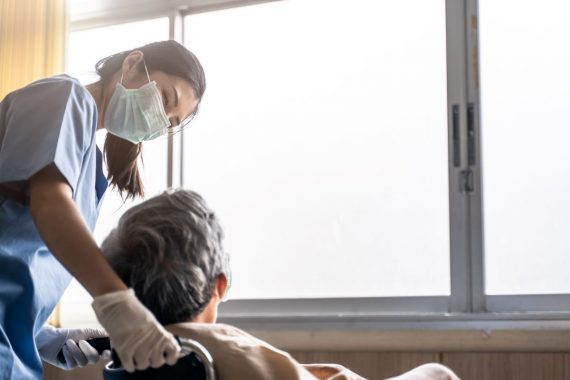Certain groups of immunosuppressed people, as well as care home residents, are among those identified as still being at ‘elevated risk’ of serious Covid outcomes despite vaccination, new research has shown.
Researchers said they hope the results will inform discussions between doctors and patients about their risk as well as prioritisation for boosters and therapies.
It comes as the shielding programme put in place to protect those who are clinically extremely vulnerable to Covid has formally closed this week.
A new Covid risk tool developed at the University of Oxford calculates ‘cumulative risk scores’ for different groups’ risk of hospitalisation or death from Covid from 14 days after the second vaccine dose ‘when substantial immunity should be expected’, the university said.
The algorithm is an updated version of the QCovid risk tool developed last year to inform vaccination prioritisation and takes into account factors such as age, sex, ethnic group and the background rate of Covid infection, it added.
Announcing the results today, Oxford University said the new tool has identified an ‘elevated risk’ to ‘those who are immunosuppressed as a result of chemotherapy, a recent bone marrow or solid organ transplant or HIV/AIDS’.
People with ‘neurological disorders including dementia and Parkinson’s, care home residents and those with chronic disorders including Down’s Syndrome’, are also at ‘elevated risk’, it added.
A paper published in the BMJ today outlined the results of the study, which analysed a representative sample of more than 6.9 million vaccinated adults in the UK – of which 5.2 million had been double-jabbed.
The sample included 2,031 Covid deaths and 1,929 Covid-related hospital admissions, of which 81 deaths and 71 admissions occurred 14 or more days after the second jab, the university said.
It added that researchers hope the data can be used to help those at higher risk make ‘more informed decisions regarding shielding’ and ‘prioritise’ them for further trials of vaccines, boosters or preventative therapies.
Julia Hippisley-Cox, University of Oxford professor of clinical epidemiology and general practice and co-author of the paper, said the tool is designed to help the NHS identify patients for ‘targeted intervention’ beyond vaccination.
She added: ‘This new tool can also inform discussions between doctors and patients about the level of risk to aid shared decision making.
‘Individual risk will always depend on individual choices as well as the current prevalence of the disease, however we hope that this new tool will help shared decision making and more personalised risk assessment.’
Aziz Sheikh, co-author of the paper and professor of primary care research and development at The University of Edinburgh, added that the tool can help identify those ‘who may benefit from interventions such as vaccine booster doses or new treatments such as monoclonal antibodies’.
However, the researchers said that the study ‘may have been limited’ by factors such as exposure since data such as occupation is not often recorded in GP or hospital records, as well as not distinguishing between type of vaccination.
They added: ‘There were relatively few Covid-19 related hospitalisations or deaths in the group who had received the second dose of any vaccine, meaning that the study lacked the statistical power to determine if the groups listed above are more, or less, at risk following a second vaccine dose compared with following the first dose.’
The study was funded by the National Institute for Health Research (NIHR) and used general practice data, as well as national linked datasets for immunisation, Covid testing, deaths and hospital episodes.
The Government this week accepted final JCVI advice that cohorts 1-9 of the first phase of the Covid vaccination campaign should have a booster jab six months after their second dose – with GPs told to prioritise boosters in care homes.
Third jabs for immunosuppressed patients were already recommended, with GPs helping to identify eligible patients to receive the jab from this week.
Meanwhile, researchers warned this month that deprivation factors should be included in Covid admission risk scores.

















